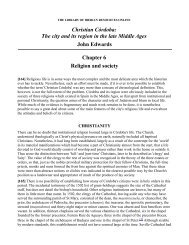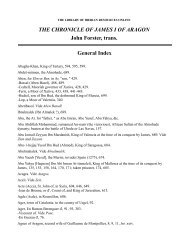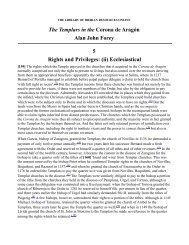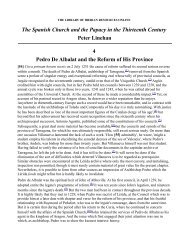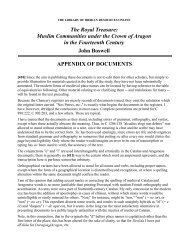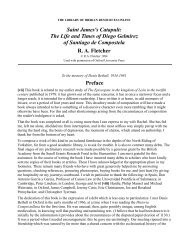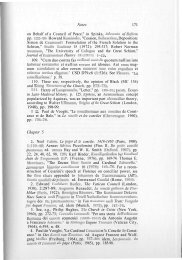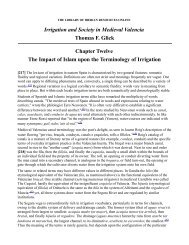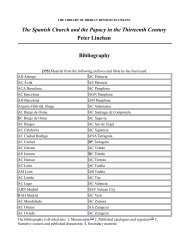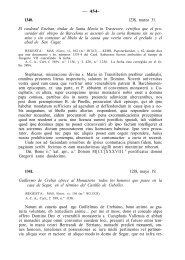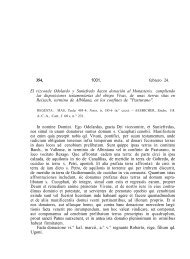PROTESTANTISM - The Library of Iberian Resources Online
PROTESTANTISM - The Library of Iberian Resources Online
PROTESTANTISM - The Library of Iberian Resources Online
Create successful ePaper yourself
Turn your PDF publications into a flip-book with our unique Google optimized e-Paper software.
the contest over the Enchiridion. (7) We shall have occasion hereafter to treat <strong>of</strong> the adventures <strong>of</strong> the<br />
alumbrada Francisca Hernández and the men whom she entangled in her toils; among them was<br />
Bernardino de Tovar, also an Erasmist, half-brother <strong>of</strong> Vergara, who incurred her enmity by rescuing<br />
him from her clutches. To revenge herself, when on trial in 1530, she accused Vergara <strong>of</strong> holding all <strong>of</strong><br />
Luther's doctrines, except as to confession, and <strong>of</strong> possessing some <strong>of</strong> Luther's works--the latter<br />
accusation being true, but when, in 1530, Manrique ordered the surrender <strong>of</strong> all such books, Vergara,<br />
after some delay, carried them to the tribunal. Another <strong>of</strong> Francisca's disciples, Fray Francisco Ortiz,<br />
when on trial, also accused Vergara <strong>of</strong> denying the efficacy <strong>of</strong> indulgences and abusing the University<br />
<strong>of</strong> Paris for condemning the writings <strong>of</strong> Erasmus, in which, he said, the Church had found no heretical<br />
errors. <strong>The</strong> tribunal collected some other evidence against Vergara and industriously searched for more,<br />
even as far as Flanders. In May, 1533, a willing witness was found in Diego Hernández, a buffoon <strong>of</strong> a<br />
priest, whom Maria Cazalla had employed as confessor until she dismissed him for seducing a nun and<br />
asserting that it was no sin. This worthy produced a list <strong>of</strong> seventy Lutheran heretics, qualified<br />
according to their degrees <strong>of</strong> guilt, among whom Vergara figured as fino lutherano endiosado<br />
(mystically abstracted). Whatever hesitation there may have been in arresting such a man, however,<br />
disappeared when it was found, in April, 1533, that he had been communicating with Tovar in prison,<br />
by bribing the <strong>of</strong>ficials. <strong>The</strong> fiscal presented his clamosa, May 17th, accusing [417] Vergara <strong>of</strong> being a<br />
fautor and defender <strong>of</strong> heretics, a defamer <strong>of</strong> the Inquisition and a corrupter <strong>of</strong> its <strong>of</strong>ficials, and his<br />
arrest and imprisonment followed on June 24th.<br />
This occasioned general surprise. Archbishop Fonseca was deeply moved and endeavored to obtain his<br />
release under bail for fifty thousand ducats, or to have him confined in a house under guard, but the<br />
only result <strong>of</strong> his efforts was to lead the tribunal to shut up the windows <strong>of</strong> Vergara's cell, converting it<br />
into a dungeon and seriously affecting his health. <strong>The</strong> trial proceeded through the regular stages. He<br />
refused the services <strong>of</strong> an advocate and, on January 29, 1534, he presented his defence, denying nearly<br />
all the errors attributed to him and explaining the rest in a Catholic sense. After this a fresh accusation<br />
was presented based on his friendship for and correspondence with Erasmus, to whom he had induced<br />
Archbishop Fonseca to grant a pension. Fonseca had died, February 24th, so that his evidence was<br />
unattainable, but Vergara pronounced the story as to the pension to be false, though had it been true it<br />
would have been innocent. Everyone knew that Erasmus had neither income nor benefice, never having<br />
been willing to accept either, and that he was supported by the liberality <strong>of</strong> gentlemen who contributed<br />
to him from all parts. Fonseca had only <strong>of</strong>fered him an income if he would come to reside at Alcalá, an<br />
<strong>of</strong>fer which Ximenes had previously made. It was true that, when Erasmus dedicated to him his edition<br />
<strong>of</strong> St. Augustin, Fonseca sent him two hundred ducats, scarce enough, in the case <strong>of</strong> so large a work, to<br />
give the printers their customary pour-boire. Fonseca felt this, and, when he heard <strong>of</strong> the death <strong>of</strong><br />
Archbishop Warham <strong>of</strong> Canterbury (d. 1532), who was accustomed to provide liberally for Erasmus, he<br />
said that he ought to pay for the printing <strong>of</strong> the book, whereupon Vergara wrote that he would send<br />
something, but it was not done. As for corresponding with Erasmus, popes and kings and the emperor<br />
himself were gratified to have letters from him and, in the printed collections <strong>of</strong> his epistles, were to be<br />
found his answers to Vergara, showing that the latter had urged him to write in confutation <strong>of</strong> Luther.<br />
<strong>The</strong> day after this defence was presented, there came the most serious evidence as yet <strong>of</strong>fered against<br />
him. This was from another distinguished Erasmist, then on trial, Alonso de Virués, who testified that,<br />
four years before, in a discussion whether the sacrament worked ex opere opéralo, Vergara ridiculed it<br />
as a fantastic opinion, [418] and further, that he did not hold as he should, certain pious and Catholic<br />
doctrines. It is true that the Council <strong>of</strong> Trent had not yet pronounced, as it did in 1547 (Sess. VII, De<br />
Sacramentis, can. viii) the self-operation <strong>of</strong> the sacrament to be de fide, but the doctrine was coeval<br />
with the development <strong>of</strong> the sacramental theory in the twelfth century and was indispensable in<br />
vindication <strong>of</strong> its validity in polluted hands against the Donatist heresy. To deny it, even in disputation,



